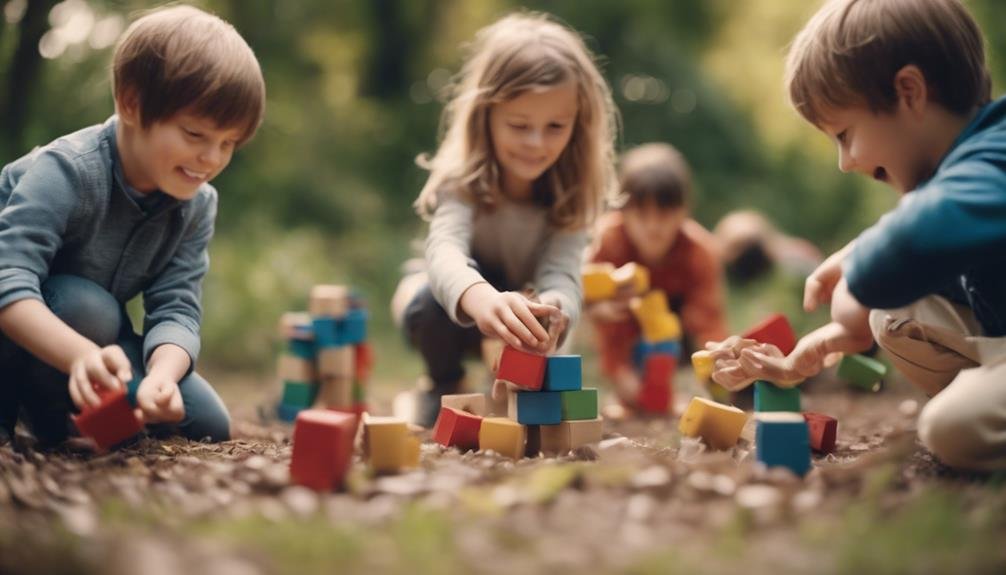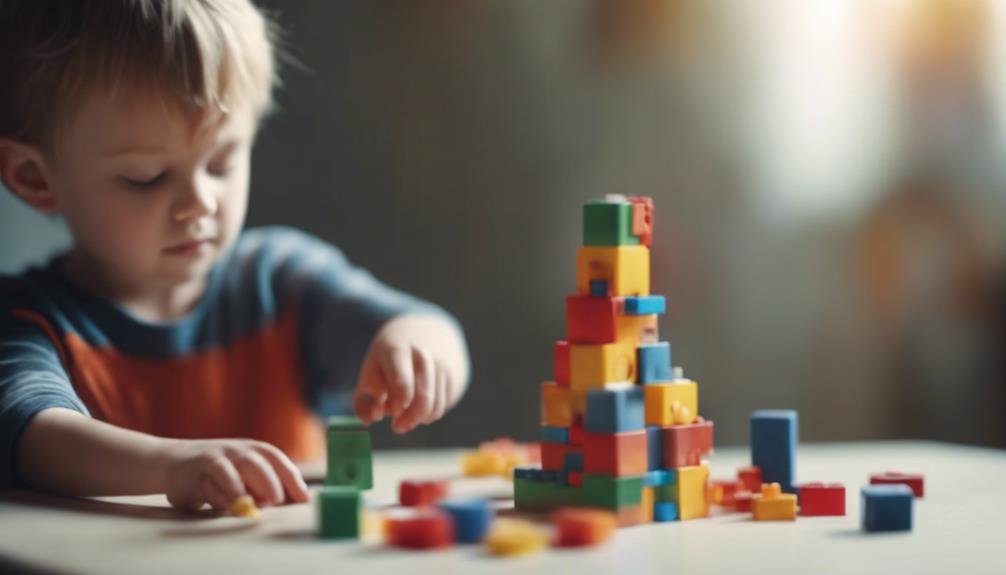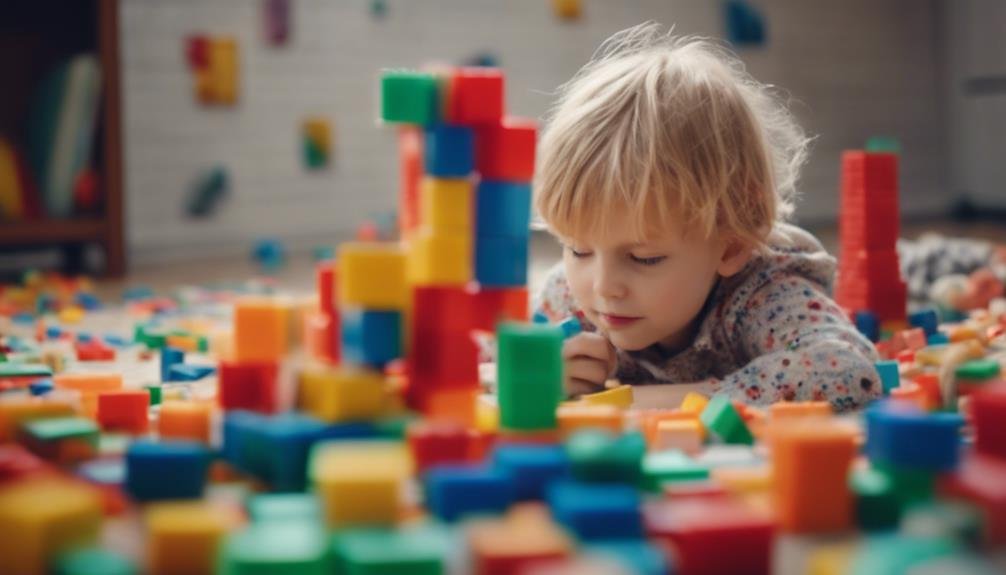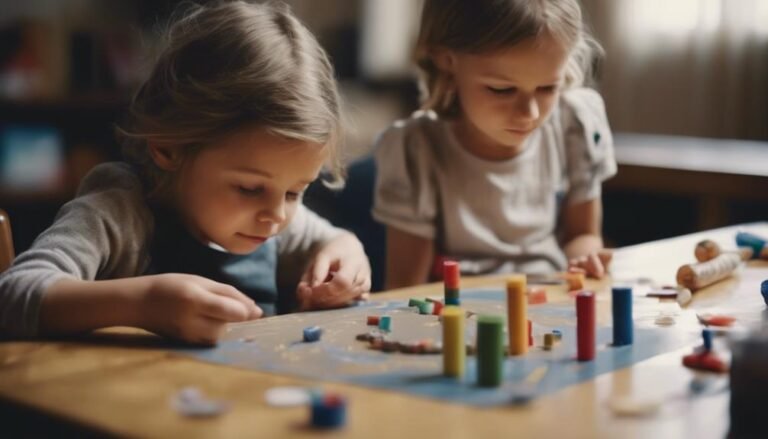The Science of Play: How Children Learn Through Play
Imagine a child at play, their imagination soaring as they construct elaborate worlds with nothing but a few toys and boundless creativity. But did you know that behind this seemingly simple act lies a complex web of learning and development?
Understanding how children learn through play is not just essential but fascinating. From problem-solving to emotional growth, the science behind play discloses the intricate processes shaping young minds.
Explore the depths of this intriguing journey where play is more than just fun—it's a fundamental building block of childhood development.
Key Takeaways
- Play engages curiosity, fosters creativity, and aids in constructing understanding of the world.
- Different types of play like creative exploration and imaginative storytelling enhance critical thinking and communication skills.
- Play boosts cognitive development by improving memory retention, problem-solving skills, and cognitive flexibility.
- Social skills like communication, teamwork, empathy, conflict resolution, and leadership are nurtured through playtime activities.
The Importance of Play in Learning

Engage your child's natural curiosity and creativity by embracing play as an essential component of their learning journey. Through creativity exploration and problem-solving techniques, play becomes a powerful tool for developing important skills. When children engage in imaginative play, they not only enhance their imagination development but also sharpen their critical thinking skills.
By encouraging play, you provide a safe space for your child to explore and experiment. Play allows them to test out new ideas, make mistakes, and learn from them. This process fosters resilience and adaptability, essential qualities for maneuvering life's challenges. When children engage in play, they're actively involved in constructing their understanding of the world around them.
Through play, children learn to communicate, collaborate, and negotiate with others, building significant social skills. This interactive process promotes empathy and emotional intelligence. So, next time your child dives into play, remember that they aren't just having fun; they're also honing important skills that will benefit them throughout their lives.
Types of Play and Their Benefits
Open the world of play and discover the diverse types of play that not only entertain but also educate and enrich your child's development. Engaging in different types of play is crucial for your child's growth, fostering creativity, problem-solving skills, and social interactions. Let's explore two key types of play: Creative Exploration and Imaginative Storytelling.
—
| Types of Play | Description | Benefits |
|---|---|---|
| Creative Exploration | Encourages experimentation | Stimulates innovation and curiosity |
| and self-expression. | Develops critical thinking skills | |
| Enhances adaptability and flexibility | ||
| Imaginative Storytelling | Involves creating narratives | Enhances language and communication skills |
| and imaginary worlds. | Fosters empathy and emotional intelligence | |
| Encourages creativity and imagination |
—
Cognitive Development Through Play

As your child explores different types of play like Creative Exploration and Imaginative Storytelling, their cognitive development blossoms through engaging experiences that spark curiosity and foster critical thinking skills. Through play, your child's mind is actively at work, enhancing memory retention and problem-solving abilities.
Here are five ways play nurtures cognitive development:
- Enhancing Critical Thinking: Encouraging your child to solve puzzles or navigate challenges in play helps develop critical thinking skills.
- Boosting Creativity: Engaging in imaginative play scenarios allows your child to think outside the box and explore new ideas.
- Improving Memory Retention: Activities that involve remembering rules, patterns, or sequences can enhance memory skills.
- Developing Problem-Solving Skills: By facing and overcoming obstacles in play, your child learns to strategize and find solutions.
- Fostering Cognitive Flexibility: Switching between different play roles and scenarios can enhance your child's ability to adapt and think flexibly.
Through play, your child's cognitive abilities are enriched, setting a strong foundation for future learning and development.
Social Skills Nurtured by Playtime
Sparkling interactions during playtime ignite the flames of social skills development in children, creating vibrant avenues for emotional intelligence growth. Through play, kids naturally enhance their communication skills and teamwork building abilities. Here is a glimpse into how play nurtures these essential social skills:
| Social Skill | Play Activity | Benefits |
|---|---|---|
| Communication | Pretend play with friends | Enhances vocabulary and language skills |
| Teamwork | Building a fort together | Teaches cooperation and collaboration |
| Empathy | Taking turns in a game | Develops understanding of others' feelings and perspectives |
| Conflict Resolution | Solving puzzles as a group | Encourages problem-solving and negotiation skills |
| Leadership | Organizing a group game | Fosters decision-making and responsibility |
Engaging in various play activities not only brings joy but also lays the foundation for strong social skills that will benefit children throughout their lives. So, the next time you see your child immersed in play, remember they are not just having fun; they are also mastering essential social abilities.
Emotional Growth Through Play Activities

In the domain of play activities, children's emotional growth blossoms like a vibrant garden, nurturing resilience and self-awareness through joyful exploration and interaction. Play is a magical area where emotions run free, helping kids navigate the landscape of feelings and relationships.
Here are some ways children benefit emotionally through play:
- Building Resilience: By overcoming challenges in play, children learn to bounce back from setbacks, developing a strong emotional backbone.
- Enhancing Empathy: Through role-playing and imaginative games, kids step into different shoes, fostering a deeper understanding of others' feelings.
- Expressing Emotions: Play provides a safe space for children to express a range of emotions, from joy to frustration, helping them learn to manage and communicate their feelings effectively.
- Creating Bonds: Collaborative play activities promote teamwork and cooperation, nurturing strong emotional connections with peers.
- Self-Discovery: Play allows children to explore their own emotions, preferences, and boundaries, fostering a sense of self-awareness and confidence.
Through play, children not only have fun but also lay the foundation for strong emotional intelligence.
Physical Development Through Active Play
Engage in lively physical activities to energize your body and mind, releasing a world of growth and development through active play. When you run, jump, and play outside, you're not just having fun; you're also honing your gross motor skills and coordination. Outdoor play provides the perfect environment for you to explore your physical abilities, whether it's climbing trees, kicking a ball, or simply racing with friends.
Sports activities are fantastic for enhancing your coordination and balance. When you dribble a soccer ball, swing a bat, or shoot hoops, you're not only improving your physical health but also sharpening your hand-eye coordination. These activities challenge your body in different ways, helping you build strength and agility while fostering a love for movement.
The Role of Play in Problem-Solving

Playing isn't just about having fun; it's also a powerful tool for honing your problem-solving skills and igniting your creative thinking abilities. When you engage in play, you aren't only enjoying yourself but also enhancing vital cognitive functions. Here's how play contributes to problem-solving:
- Encourages Creative Thinking: Play allows you to explore different solutions in a safe environment, fostering creativity.
- Develops Critical Reasoning: By facing challenges during play, you learn to analyze situations and make decisions effectively.
- Promotes Adaptability: Through play, you learn to adapt to changing circumstances and develop resilience in problem-solving.
- Enhances Collaboration: Play often involves interaction with others, teaching you to work as a team to solve problems.
- Boosts Confidence: Successfully overcoming obstacles in play boosts your confidence in tackling real-life challenges.
Frequently Asked Questions
How Can Parents Encourage Play-Based Learning at Home?
To encourage play-based learning at home, you should create opportunities for outdoor exploration and sensory activities. Engage in imaginative storytelling and role-playing to spark creativity. By incorporating these activities, you can make learning fun and engaging for your child.
What Are Some Common Misconceptions About the Role of Play in a Child's Development?
You might think play is just fun, but it's actually critical for kids. Misconceptions like 'play is a waste of time' are debunked. Play builds creativity, problem-solving, and social skills, shaping successful adults.
How Does Play Help Children Develop Creativity and Imagination?
When you engage in role-playing scenarios, your creativity blooms as you imagine new worlds and characters. Through artistic expression, you paint pictures with your mind, fostering a sense of wonder and innovation that shapes your unique imagination.
Are There Any Specific Ways to Incorporate Play Into Academic Subjects Like Math or Science?
You can infuse play into math and science by trying hands-on experiments and playing interactive games. This approach helps you grasp real-world applications, improves problem-solving skills, and makes learning fun and engaging.
Can Play-Based Learning Be Beneficial for Children With Learning Disabilities or Special Needs?
Inclusive environments and adaptive strategies can make play-based learning a powerful tool for children with learning disabilities. By tailoring activities to individual needs and providing strong support systems, kids can thrive and learn joyfully.
Conclusion
So, now you know how children learn through play – it's like a colorful puzzle that pieces together their development.
Play is the magic wand that sparks creativity, builds friendships, and shapes young minds.
Like a garden blooming with knowledge, playtime cultivates skills that will last a lifetime.
So next time you see a child playing, remember, they're not just having fun – they're learning, growing, and thriving through the power of play.








